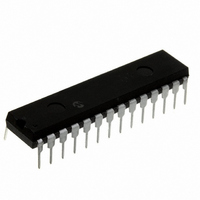PIC16F913-I/SP Microchip Technology, PIC16F913-I/SP Datasheet - Page 6

PIC16F913-I/SP
Manufacturer Part Number
PIC16F913-I/SP
Description
IC PIC MCU FLASH 4KX14 28DIP
Manufacturer
Microchip Technology
Series
PIC® 16Fr
Datasheets
1.PIC16F616T-ISL.pdf
(8 pages)
2.PIC16F913-ISS.pdf
(330 pages)
3.PIC16F913-ISS.pdf
(8 pages)
4.PIC16F913-ISS.pdf
(34 pages)
5.PIC16F913-ISO.pdf
(274 pages)
Specifications of PIC16F913-I/SP
Program Memory Type
FLASH
Program Memory Size
7KB (4K x 14)
Package / Case
28-DIP (0.300", 7.62mm)
Core Processor
PIC
Core Size
8-Bit
Speed
20MHz
Connectivity
I²C, SPI, UART/USART
Peripherals
Brown-out Detect/Reset, LCD, POR, PWM, WDT
Number Of I /o
24
Eeprom Size
256 x 8
Ram Size
256 x 8
Voltage - Supply (vcc/vdd)
2 V ~ 5.5 V
Data Converters
A/D 5x10b
Oscillator Type
Internal
Operating Temperature
-40°C ~ 85°C
Processor Series
PIC16F
Core
PIC
Data Bus Width
8 bit
Data Ram Size
256 B
Interface Type
SSP/I2C/AUSART/SPI
Maximum Clock Frequency
20 MHz
Number Of Programmable I/os
24
Number Of Timers
3
Operating Supply Voltage
2 V to 5.5 V
Maximum Operating Temperature
+ 85 C
Mounting Style
Through Hole
3rd Party Development Tools
52715-96, 52716-328, 52717-734
Development Tools By Supplier
PG164130, DV164035, DV244005, DV164005, PG164120, ICE2000, DV164120
Minimum Operating Temperature
- 40 C
On-chip Adc
5-ch x 10-bit
Package
28SPDIP
Device Core
PIC
Family Name
PIC16
Maximum Speed
20 MHz
Lead Free Status / RoHS Status
Lead free / RoHS Compliant
Lead Free Status / RoHS Status
Lead free / RoHS Compliant, Lead free / RoHS Compliant
Available stocks
Company
Part Number
Manufacturer
Quantity
Price
Company:
Part Number:
PIC16F913-I/SP
Manufacturer:
TI
Quantity:
212
second half (0x2000-0x3FFF) being configuration
PIC16F91X/946
2.0
2.1
The user memory space extends from 0x0000-0x0FFF
for PIC16F913/914 and from 0x0000-0x1FFF for
PIC16F916/917/946. In Program/Verify mode, the
program memory space extends from 0x0000 to 0x3FFF,
with the first half being user program memory and the
memory. The PC will increment from 0x0000 to 0x1FFF
(or 0x0FFF) and wrap to 0x0000, 0x2000 to 0x3FFF and
wrap-around to 0x2000 (not to 0x0000). Once in
configuration memory, the highest bit of the PC stays a
‘1’, thus always pointing to the configuration memory.
The only way to point to user program memory is to reset
the part and re-enter Program/Verify mode as described
in Section 3.0 “Program/Verify Mode”.
For the PIC16F91X/946 devices, the configuration
memory
implemented. However, only locations 0x2000-0x2003
and 0x2007-0x2009 are available. Other locations are
reserved.
2.2
A user may store identification information (user ID) in
four designated locations. The user ID locations are
mapped in 0x2000-0x2003. It is recommended that the
user use only the seven Least Significant bits (LSb) of
each user ID location. The user ID locations read out
normally, even after code protection is enabled. It is
recommended that ID locations are written as
‘xx xxxx xbbb bbbb’ where ‘bbb bbbb’ is user ID
information.
The 14 bits may be programmed, but only the 7 LSbs
are displayed by MPLAB
care” bits and are not read by MPLAB
DS41244F-page 6
MEMORY DESCRIPTION
Program Memory Map
User ID Locations
space,
0x2000-0x2009,
®
IDE. The xxxx’s are “don’t
®
are
IDE.
physically
2.3
For the PIC16F91X/946 devices, the 8 MHz internal
oscillator (INTOSC), the Power-on Reset (POR), and
the Brown-out Reset (BOR) modules are factory
calibrated and stored in the Calibration Word 1
(0x2008). The Low-Voltage Detect (LVD) module is
factory calibrated and stored in the Calibration Word 2
(0x2009). See the applicable device data sheet for
more information.
The Calibration Word locations are written at the time
of manufacturing and are not erased when a Bulk
Erase is performed. See Section 3.1.6.10 “Bulk
Erase Program Memory” for more information on the
various erase sequences. However, it is possible to
inadvertently write to these locations. The device may
not function properly or may operate outside of specifi-
cations if the Calibration Word locations do not contain
the correct value. Therefore, it is recommended that
the Calibration Words be read prior to any program-
ming procedure and verified after programming is com-
plete. See Figure 3-22 for a flowchart of the
recommended verification procedure.
The device should not be used if the verification of the
Calibration Word values fail after the device is
programmed. The 0x3FFF value is a special case, it is
a valid calibration value but, it is also the erased state
of the register.
Note:
Calibration Word
The device should not be used if
verification
locations fails. This information should be
reported to the user through the user
interface of the device programmer.
© 2009 Microchip Technology Inc.
of
the
Calibration
Word


















